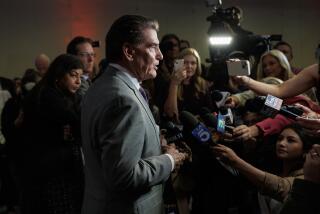Ed Davis Hits Campaign Gift Limits : GOP Senate Hopeful Says U.S. Curbs Favor Incumbents
- Share via
Republican U.S. Senate candidate Ed Davis, saying that the “so-called reforms of the Watergate era are not working,” Friday urged the elimination of contribution limits in federal campaigns.
Unveiling what he called the “Davis Curve” at a Burbank press conference, Davis, a state senator from Valencia, argued that the fewer limitations placed on contributions, the less important money will be--a downward curve in importance.
“The $1,000 federal limit is a penalty for running for office,” Davis charged, because it forces candidates to spend most of their time seeking money from large numbers of people in order to have enough cash to pay for television advertising, direct mail and other campaign costs.
“Under these restrictions, we have gotten away from discussions of a candidate’s character or his positions on the issues,” Davis said. “Now the only thing that matters is money, money, money. . . . I am now reading articles that say April 15 will tell us who is going to win the Republican Senate primary in California, because that is the day we will report what we have raised and what we have on hand. I don’t agree with that.”
Under federal election laws enacted more than a decade ago, an individual may contribute no more than $1,000 to a candidate in a primary and $1,000 in the general election. A political action committee’s contributions are limited to $5,000 in each phase.
Ending these restrictions, Davis argued, would allow little-known federal candidates to raise large sums from a few friends to get their campaigns under way. As it stands now, Davis said, incumbents and celebrities have a huge advantage in a federal campaign.
Davis also proposed that corporations and labor unions be allowed to contribute directly to candidates. Under current law, they may contribute only through political action committees.
The senator said that if he goes to the U. S. Senate he would propose eliminating taxpayer funding of presidential candidates in the general election and would ban the transfer of campaign money from one candidate to another.
“We should keep strict reporting of all sources of contributions so the voters will know where the money is coming from,” Davis said. “That works.”
Davis said he did not think that lifting federal contribution limits would lead to situations in which a few corporations or wealthy individuals would handpick candidates and put them into office.
“I just don’t think you see that many cases in which one person has contributed a lot of money to a campaign,” Davis said, adding that he thought the lack of contribution limits in California state elections had led to “very good government.”
More to Read
Get the L.A. Times Politics newsletter
Deeply reported insights into legislation, politics and policy from Sacramento, Washington and beyond. In your inbox twice per week.
You may occasionally receive promotional content from the Los Angeles Times.










